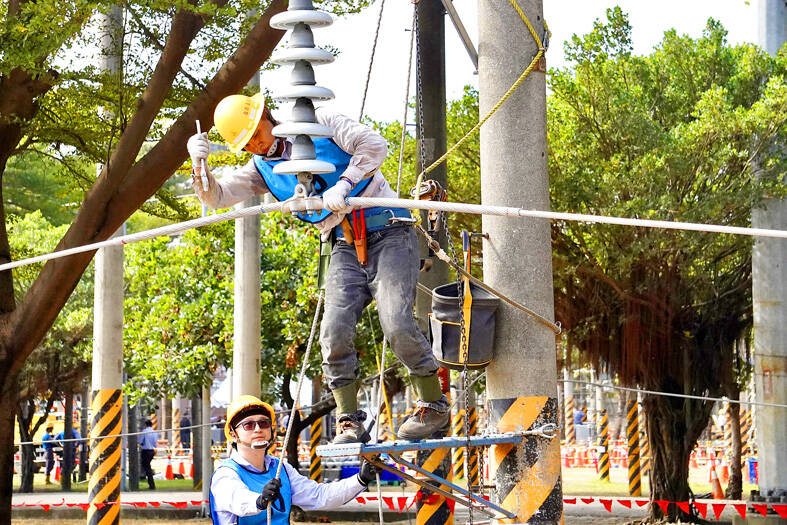Taiwan Power Co (Taipower, 台電) on Thursday signed a memorandum of understanding (MOU) with Japan’s IHI Corp and Sumitomo Corp for a pilot project that would use ammonia co-firing at its Talin Thermal Power Plant in Kaohsiung, which would account for 5 percent of its power generation.
The project aims to achieve 5 percent ammonia co-firing at the coal-fired plant by 2030, Taipower vice president Cheng Ching-hung (鄭慶鴻) said at the signing event in Taipei.
This would reduce carbon dioxide emissions by 9,000 tonnes per year, equivalent to about 23 Daan Forest Parks in Taipei, he added.

Photo: CNA
As ammonia firing does not generate carbon dioxide and the chemical can be stored in liquid form at minus-33°C, it has the potential to become a green fuel that can be efficiently transported and stored, Taipower said.
As Taipower pursues its net zero emissions by 2050 goal, it has been scaling up the ratio of power generation by renewable energy, but decarbonization in thermal power generation is also crucial, Cheng said.
Other than ammonia co-firing technology, he said that a pilot project involving gas-fired hydrogen blending for power generation is also being undertaken at Hsinta Power Plant in Kaohsiung, and a carbon capture and storage system has been installed at Taichung Power Plant.
The two Japanese corporations were also involved in the construction of two new power generation units — ultra-supercritical pressure coal-fired boilers — at Talin Power Plant which were completed in 2018.
“The units’ carbon emissions are already low, and additional technical cooperation with IHI and Sumitomo would help further develop decarbonizing technologies,” Cheng said.
Also at the signing ceremony were Yukihisa Ozawa, vice president of IHI’s resources, energy and environment business, and Seiji Kitajima, director of the energy innovation initiative at Sumitomo Corp.
Ozawa said IHI has successfully implemented small-scale ammonia co-firing in Japan and Indonesia, and is expected to use the experience to contribute to the realization of Taiwan’s net zero goal.
Kitajima said that Sumitomo has in recent years been working on building ammonia supply chains and ammonia-fueled ships, and as part of the pilot project, the company will install Japan’s ammonia-receiving and supply system at the Talin plant.
Asked about local ammonia supply, Cheng told reporters that as Taiwan has insufficient supply and relies on imports, the focus of the pilot project would be on co-firing technology and retrofitting the plants.

PATENTS: MediaTek Inc said it would not comment on ongoing legal cases, but does not expect the legal action by Huawei to affect its business operations Smartphone integrated chips designer MediaTek Inc (聯發科) on Friday said that a lawsuit filed by Chinese smartphone brand Huawei Technologies Co (華為) over alleged patent infringements would have little impact on its operations. In an announcement posted on the Taiwan Stock Exchange, MediaTek said that it would not comment on an ongoing legal case. However, the company said that Huawei’s legal action would have little impact on its operations. MediaTek’s statement came after China-based PRIP Research said on Thursday that Huawei filed a lawsuit with a Chinese district court claiming that MediaTek infringed on its patents. The infringement mentioned in the lawsuit likely involved

Taipei is today suspending work, classes and its US$2.4 trillion stock market as Typhoon Gaemi approaches Taiwan with strong winds and heavy rain. The nation is not conducting securities, currency or fixed income trading, statements from its stock and currency exchanges said. Authorities had yesterday issued a warning that the storm could affect people on land and canceled some ship crossings and domestic flights. Taiwan Semiconductor Manufacturing Co (TSMC, 台積電) expects its local chipmaking fabs to maintain normal production, the company said in an e-mailed statement. The main chipmaker for Apple Inc and Nvidia Corp said it has activated routine typhoon alert

GROWTH: TSMC increased its projected revenue growth for this year to more than 25 percent, citing stronger-than-expected demand for AI devices and smartphones The Taiwan Institute of Economic Research (TIER, 台灣經濟研究院) yesterday raised its forecast for Taiwan’s GDP growth this year from 3.29 percent to 3.85 percent, as exports and private investment recovered faster than it predicted three months ago. The Taipei-based think tank also expects that Taiwan would see a 8.19 percent increase in exports this year, better than the 7.55 percent it projected in April, as US technology giants spent more money on artificial intelligence (AI) infrastructure and development. “There will be more AI servers going forward, but it remains to be seen if the momentum would extend to personal computers, smartphones and

Catastrophic computer outages caused by a software update from one company have once again exposed the dangers of global technological dependence on a handful of players, experts said on Friday. A flawed update sent out by the little-known security firm CrowdStrike Holdings Inc brought airlines, TV stations and myriad other aspects of daily life to a standstill. The outages affected companies or individuals that use CrowdStrike on the Microsoft Inc’s Windows platform. When they applied the update, the incompatible software crashed computers into a frozen state known as the “blue screen of death.” “Today CrowdStrike has become a household name, but not in